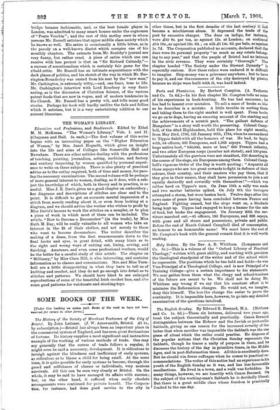The English Synday. By Edward R. Bernard, MA. (Methuen and
Co. is. 6d.)—These six lectures, delivered two years ago, treat the subject theoretically and practically. Canon Bernard distinguishes between the Hebrew and the Jewish or post-exilic Sabbath, giving as one reason for the increased severity of the latter that when sacrifice was impossible the Sabbath was the one piece of ritual which the exiles could practise. He disposes of the popular notions that the Christian Sunday represents the Sabbath, though he traces a unity of purpose in them, and he discusses the history of the day in primitive times, in the Middle Ages, and in post-Reformation times. All this is excellently done. But he should win fewer suffrages when he comes to practical re- commendations. The writer of this notice had an experience in his youth of the English Sunday as it was, and has less favourable recollections. He lived in a town, and a walk was forbidden. In many things, however, we are heartily with Canon Bernard. On the subject of the working-man's Sabbath he is decidedly liberal. But there is a great middle class whose freedom is practically limited to the one day.










































 Previous page
Previous page